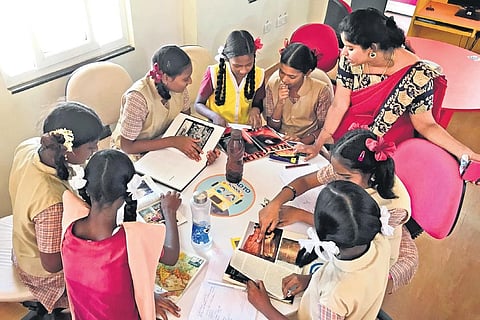

CHENNAI: Education in India is more often than not synonymous with academics. But for every spoken word and written theory, there is a creative skill or artistic talent to be explored that is increasingly gaining relevance in today’s content-consuming world. Making the same accessible to students of the government school in Pulianthope is Chennai Photo Biennale (CPB), which is collaborating with fellows of Teach For India (TFI) to provide a six-month photography workshop with children of Class 3, 4, and 6.
“The students have expressed interest in doing more things and so, the fellows are bringing in art programmes to the school, photography being one of them. This programme gives them an avenue to be creative and have fun with their classmates. It’s been a stressful few years for kids; it’s been a lot of pressure on them and teachers to get back. Our programmes make sure that school also remains a place for enjoyment and pleasure, and a place where children are allowed to be expressive and tell their own stories,” shares Gayatri Nair, director of education, CPB.
The workshop is a part of TFI fellow Aishwarya M’s Be The Change project (a requirement from all fellows in their second year) and will kick off a series of varied activities that she is planning for the students. “It is about the presentation of the community. The school in Pulianthope where I work is based in North Madras. I wanted to build something that would upskill the kids in media and art to be able to represent their communities, for themselves with workshops in photography, writing, filmmaking, audio-visual production and more (if all goes well),” she informs.
Presentations of representations
The weekly workshop will cover basics, explains Gayatri, as the students’ exposure to photography has been minimal. They will be working on an iPhone (which is a part of their inventory) and instead of focussing on technical aspects, they will teach more about observing their surroundings, looking for interesting things that catch the eye, documenting their lives and showcasing some aspects of the community, she adds.
That their efforts in these six months will culminate into an exhibition of their works is the hope from Aishwarya. “(The exhibition) would be the constructive outcome but other than that, (at the end of it, I hope) they have a sense of what representation is and how their community is represented by people who do not belong to their community. We have a lot of films and music about North Madras in mainstream media and there is a certain way it is represented.
There are people from the community who go on to represent the community but that’s a very small number. I’m hoping that the children go on to have a sense of this — how the community is represented and how it must be. It is not about being politically correct but about portraying their culture and heritage. There are a lot of things that Pulianthope in particular and North Madras in general is known for; other than gang wars and substance abuse. These are also things that the children want to talk about; they have told me,” she shares.
Access and availability
Having recognised the importance of arts-based education in schools, CPB began its journey of teaching schoolchildren in 2018. “What I think our system never did was leave room to breathe, be creative and have fun. Creativity is an important 21st century skill; everybody wants a more creative employee in their workforce as opposed to a cookie cutter box. It’s also fundamental that art is a way to (better) mental well-being and happiness, and we have seen it during Covid, how such creative outlets have helped calm children down when everything else seemed so broken,” notes Varun Gupta, director - Chennai Photo Biennale.
But there is also a need to acknowledge that there is a lack of resources and a subsequent lack of accessibility. When it comes to government schools, Aishwarys says, it depends from school to school as the infrastructure changes in each one. Some have the room and space for children while many don’t. The teacher-to-student ratio also often makes it difficult for such activities.
To support this programme, CPB is raising funds from the public to cover mentor costs, exhibition production, and logistics (equipment, travel, food and stationery). Perhaps, you’re looking to lend a hand?
To donate towards the programme, visit bit.ly/fundraiser_tfi or @chennaiphotobiennale on Instagram.